Tech
The Latest Tech News in Crypto and Blockchain

Feb. 14: Sommelier, a DeFi platform offering yield-generating vaults, is expanding to Ethereum layer 2s via Axelar’s cross-chain messaging. According to the team: “This allows accessing new opportunities and users across chains. Sommelier launches its first layer 2 vault, Real Yield ETH, on Arbitrum. The vault uses dynamic strategies like liquidity provision and risk-managed leverage to optimize yields on ETH-denominated assets. Building on the success of a similar vault on Ethereum mainnet, the Arbitrum vault aims to outperform holding staked ETH two- to three-fold.”
Core Chain, Blockchain With Bitcoin Security, Ethereum Compatibility, Offers $300K for Developers
Feb. 14: Core Chain, a blockchain that combines the security of Bitcoin with Ethereum’s EVM compatibility, is launching its support program called Core Starter, according to the team: “This program provides over $300,000 in tools and incentives for developers building dApps on Core. Core Chain will provide cost support to platforms like Google Cloud, CertiK, TokenSoft, Hacken, Halborn, Elixir, Request Finance and Questly.”
Protocol Village is a regular feature of The Protocol, our weekly newsletter exploring the tech behind crypto, one block at a time. Sign up here to get it in your inbox every Wednesday. Project teams can submit updates here. For previous versions of Protocol Village, please go here. Also please check out our weekly The Protocol podcast.
Nym Gets Grant to Bridge Privacy Protections of Mixnet to Zcash
Feb. 13: Nym Technologies, focused on privacy, announced that it has received a grant from the Zcash Community Grants, bringing the metadata privacy protections of the Nym mixnet to the Zcash ecosystem. According to the team: “Nym will work with Zcash’s already privacy-preserving infrastructure to help provide an end-to-end protected solution for privacy for Zcash users, solving data leakage at the network layer that is currently undefended by Zcash. Unlike any other privacy technology, the Nym mixnet prevents government, corporate and criminal surveillance adversaries from tracing metadata.” (ZEC)
Babylon Staking Protocol (on Bitcoin) to Integrate Into Cosmos Network
Feb. 13: Cosmos Hub and Babylon, a platform developing the first Bitcoin Staking Protocol for the PoS ecosystem, announced a proposed initiative to integrate Babylon’s staking protocol into the Cosmos network. According to the team: “If the proposal passes, Bitcoin holders will be able to stake their bitcoins to secure Cosmos Hub ICS consumer chains. Babylon is a trustless and self-custodial staking protocol that leverages timelock contracts to enable Bitcoin staking across traditional PoS chains. The result is a secure method that allows PoS chains to access over $800 billion in idle bitcoin.” CoinDesk 20 assets: (ATOM) (BTC)
Peaq Blockchain Expands Ecosystem With PowerPod’s DePIN for ‘Community-Owned EV Charging’
Feb. 13: Peaq, a blockchain for real-world applications, announced the expansion of its ecosystem, as PowerPod joins to decentralize electric vehicle (EV) charging. According to the team: “PowerPod is building a decentralized physical infrastructure network (DePIN) of community-owned EV charging stations. As part of the integration, the project will use peaq as the layer-1 backbone for its DePIN, using it to store charging session data, handle transactions and reward the users with tokens for powering a more sustainable future of mobility… As part of its integration with peaq, PowerPod will outfit these devices with their multi-chain self-sovereign peaq IDs, enabling them to connect with the blockchain. It will also leverage peaq for data storage and eventually launch its token on the peaq mainnet, set to go live in the coming months. It will also use peaq to set up its rewards mechanism, granting users tokens for interacting with the DePIN.”
Toposware Collaborating With Polygon to Build Type 1 ZkEVM
Feb. 13: Toposware and Polygon have joined forces to introduce Plonky2, describing it as “the most cost-effective Type 1 ZK-EVM, and a breakthrough in cryptographic research. The Plonky2 zkEVM operates within Ethereum’s ecosystem and reduces transaction costs.” according to the team. From the blog post: “This means all new and existing smart contracts deployed to Ethereum and compatible chains are now able to take advantage of the power of zero-knowledge proofs.” Separately, the Topos Builders Program Community Fund is now live.
Feb. 13: Watches.io, an end-to-end tracking and trading ecosystem for watches, has raised $1.9 million in a pre-seed funding round, led by Lemniscap. According to the team: “Watches.io aims to simplify the tracking, trading, and purchasing process for luxury watches, turning them into tradable assets.” According to a press release: “The round was led by Lemniscap, with participation from Big Brain Holdings, Marin Ventures, Soft Holdings Inc, Builder Capital, Darkside Capital, Non-Fungible Technologies, and a host of top Web3 founders and angel investors, including partners from top funds such as Dragonfly, Lattice, No Limit Holdings.” It uses an NFT infrastructure supported by NFT finance (NFTfi) platforms.
Titan Mining Enables ‘Frequent BTC Earnings’ Through Lightning Network
Feb. 13: The Titan Mining team is enabling frequent BTC earnings for mining efforts, providing Bitcoin miners with immediate access to their earnings through the Lightning Network, according to the team: “Miners receive their Bitcoin earnings approximately every 10 minutes without needing to reach a minimum balance before payout.”
Ledger, Coinbase Pay Give Users Direct Access to Buy, Sell Crypto
Feb. 13: Hardware wallet maker Ledger announced that it is integrating products with Coinbase, allowing Ledger users to buy digital assets using the crypto exchange’s Coinbase Pay as an on-ramp. Bringing Coinbase Pay into the Ledger Live app is supposed to benefit Ledger users, according to a press release seen by CoinDesk, making it easier for users to receive their crypto purchases from Coinbase directly on their Ledger hardware wallet, without any additional fees.
Fordefi Raises $10M to Make Crypto Safer With Institutional-Grade Wallet to Retail-Facing Platforms
Feb. 13: Crypto wallet firm Fordefi raised $10 million in venture capital investment, aiming to solve one of the biggest pain points in crypto by expanding its institutional-focused wallet offering to retail-facing platforms, the company told CoinDesk in an exclusive interview. The fundraising was led by Electric Capital, with Paxos and Alchemy joining as new investors. The investment followed a $18 million seed capital raise in November 2022 with Lightspeed Ventures, Pantera Capital, and Jump Crypto, among others.
Crypto Exchange Bybit Announces Launch of Bybit Card in Australia
Feb. 13: Bybit, a crypto exchange, announced the launch of the Bybit Card in Australia. Powered by Mastercard, this card debits crypto balances on Bybit and converts them seamlessly into fiat money used to pay for card transactions.
Analog Raises $16M To Become One-Stop Shop For Blockchain Interoperability
Feb. 12: Analog, a U.S.-based Web3 platform focused on omni-chain interoperability, announced the completion of its latest funding round. According to the team: “Investors in the round include Balaji Srinivasan, Mike Novogratz’s Samara Asset Group, Tribe Capital, NEAR and many more. A main component of Analog, The Timechain, is a Rust-based blockchain that hosts a number of validators, called Time Nodes and Chronicle Nodes, that validate and relay messages. It enables different applications to connect to different blockchains.”
Identity Protocol Rarimo’s New ‘Freedom Tool’ Uses Phones for Biometrics
Feb. 12: Rarimo, a digital identity protocol based on the Tendermint Consensus and Cosmos SDK blockchain development kit, has released Freedom Tool, an open-source software for running anonymized elections and polls, according to the team: “Built with a combination of zero-knowledge and blockchain technology, it aims to solve the technical challenge of enabling digital identity checks while also protecting citizens from tracking. Citizens prove their eligibility by scanning their biometric passports with their phones. The data on the biometric chip inside the passport is verified, and upon confirming authenticity, an anonymous voting pass is issued. The citizen then uses this pass to cast their vote.”
Aave V3 Now on Ethereum Layer-2 Scroll’s Mainnet
Feb. 12: The Aave-Chan Initiative and Scroll, an Ethereum layer-2 network powered by zero-knowledge or ZK technology, announced the successful deployment of Aave V3 on the Scroll Mainnet, according to the team, “marking the first market on a ZK rollup and providing users with a secure, scalable and user-friendly environment. The combined expertise of Aave V3 and Scroll creates a synergy that is set to invigorate both communities. This launch on Scroll represents Aave DAO’s first deployment to a zkEVM chain with others expected to be coming shortly this quarter.” (AAVE)
Lit Protocol, for Identity-Based Encryption, Launches ‘Litv0’
Feb. 12: Lit Protocol has launched Litv0, “a significant advancement in the way developers can create, control and manage secrets, keys and private data,” according to the team: “Lit offers a native system for identity-based encryption, compute and signing, merging TSS, secure hardware, blockchain, and IPFS for fault-tolerant key management and serverless functions.”
Tezos Blockchain’s ‘Oxford 2’ Upgrade Brings ‘Private Smart Rollups’
Feb. 10: The Tezos blockchain on Friday activated its fifteenth upgrade, called Oxford 2, according to the team: “The upgrade introduces private smart rollups as a new security feature for developers, a smoother staking process for validators and an adjustment to slashing penalties, among other changes. The upgrade comes a month before the main net launch of Etherlink, an EVM-compatible Layer 2 built on Tezos and powered by Smart Rollups.” (XTZ)
Aptos Ecosystem Summit Highlighted News, Best Practices Across 32 Projects
Feb. 10: The Aptos Ecosystem Summit was built around setting up Aptos ecosystem projects, protocols and builders for success, according to the team: “The week-long event celebrated achievements, unveiled news and highlighted best practices across 15+ countries, 32 projects, and 50+ investors from 26 firms. On the sidelines of the agenda, 122 one-on-one conversations took place. These 1:1 interactions between ecosystem leaders and Aptos Foundation representatives allowed for in-depth discussions, hands-on support, and the sharing of specific insights related to engineering, marketing, product development, legal, and more.” (APT)
DYdX Foundation Gets $30M From DYdX Treasury After DAO Vote
Feb. 9: The dYdX Foundation has secured $30M in DYDX from the dYdX Chain Community Treasury, after a vote by the dYdX DAO, according to the team: “The Foundation Fundraise proposal had a 98% Yes vote and a 86.4% voter turnout. This funding provides 3 more years of runway for the dYdX Foundation to execute its roadmap.” (DYDX)
Web3 Foundation Funds Ideal Labs, ‘Encryption to the Future’
Feb. 9: Web3 Foundation, supporting Polkadot as its flagship protocol, announced funding support for Ideal Labs in the creation of the Encryption to the Future (ETF) network, according to the team: “The funding is part of the Foundation’s Decentralized Futures Funding Program, backed by $20M USD and 5M DOT. The ETF Network is a cutting-edge substrate-based blockchain leveraging a unique consensus mechanism focused on publicly variable on-chain randomness and timelock encryption. The initiative is a crucial step towards addressing the challenges of secure delayed transactions.” (DOT)
Zeitgeist to Integrate USDC Via Cross-Consensus Messaging (XCM)
Feb. 9: Zeitgeist, a leading platform in the decentralized prediction markets, is announcing its integration of USDC, according to the team: “USDC will be integrated via Cross-Consensus Messaging (XCM). The development allows for the effortless transfer of USDC from two projects within the Polkadot ecosystem, HydraDX & Moonbeam, into Zeitgeist. This is more than just an event; it’s a testament to Zeitgeist’s ongoing commitment to the Polkadot ecosystem. By leveraging Polkadot’s advanced technological framework and collaborative ethos, Zeitgeist continues to offer innovative solutions in the prediction market arena.”
Polygon Releases ‘Type 1 Prover,’ Claiming Milestone Set by Ethereum’s Vitalik Buterin
Feb. 8: Polygon Labs, the developer behind the Polygon blockchain, released Thursday a “Type 1 prover,” a new component allowing any network compatible with Ethereum’s EVM standard to become a layer-2 network powered by zero-knowledge proofs, and to connect to Polygon’s broader ecosystem. The Polygon team claimed the release as a major breakthrough, a technological feat that even Ethereum co-founder Vitalik Buterin has touted as key to making auxiliary layer-2 networks nearly equivalent to the base blockchain. CoinDesk 20 asset: {{MATIC}}
Schematic of Polygon’s “Type 1 Prover” (Polygon)
Layer-2 Blockchain Developer StarkWare Plans ‘Cairo’ to Verify Layer-3s
Feb. 8: StarkWare, the developer behind the Starknet blockchain, announced on Thursday the launch of a new “Cairo Verifier” in the next few weeks, opening the door to layer-3 application-based chains on Starknet. Cairo, which the StarkWare and another developer, Herodotus, worked on together, is a key piece of technology that verifies proofs and posts them back to the layer-2 blockchain, instead of Ethereum’s mainnet.
FuzzLand, Web3 Security Firm, Raises $3M Led by 1kx
Feb. 8: FuzzLand, a Web3 security and analytics company, has closed a $3M seed funding round led by 1kx with participation from HashKey Capital, SNZ and Panga Capital, according to the team: “The funding will help accelerate research and development into automated solutions for smart contract analysis using dynamic analysis and distributed computing software. Founded by Chaofan Shou, Jeff Liu and Koushik Sen, FuzzLand aims to deliver cutting-edge vulnerability detection and analytics capabilities that go beyond traditional solutions.”
Order-Routing Protocol Flood Raises $5.2M Led by Bain Capital Crypto, Archetype
Feb. 8: Flood, a protocol for order routing, management, and settlement, announced its $5.2M seed funding round, co-led by Bain Capital Crypto and Archetype, with participation from Robot Ventures. According to the team: “Flood provides decentralized application (dApp) developers with a suite of tools for owning and managing the entire lifecycle of their application’s order flow. As the only decentralized exchange (DEX) currently available on the market with operational hooks, the user experience allows traders to quickly settle their transactions while seamlessly staying within the Flood ecosystem.”
Casper Releases ‘Peregrine’ Patch for 16-Second Block Times, Cost Reductions
Feb. 8: Casper Association, supporting the proof-of-stake, smart-contracts blockchain Casper Network featuring a WASM code environment, sent the following message: “The Casper Network Peregrine (v1.5.6) update is a patch release that includes enhancements and exciting new features to network operations. Significant changes are: the reduction of block times to 16 seconds, the 99% refund of unspent funds, and the lowering of control flow opcode costs, resulting in a reduction in mint and transfer costs for contracts. Casper’s architecture is uniquely designed for continual evolution, meeting the evolving demands of its users, partners, and the projects it supports.”
APAC-Focused ‘TON Bootcamp’ Accepts First 12 Projects for Up to $500K Each
Feb. 8: Created in collaboration with Hashkey, TON Bootcamp has now accepted its first twelve projects, according to the team: “The APAC-focused accelerator has earmarked up to $500,000 for each of these teams, with the selected projects uniquely leveraging blockchain technology within Telegram’s Web3 ecosystem. These projects will further embed TON’s Web3 functionalities within Telegram’s existing platform and engage Telegram’s over 800 million monthly active users. The program reflects TON Foundation’s commitment to the APAC region and community as it looks to leverage Hong Kong’s industry-leading regulatory environment.”
Dtravel Receives Backing From Borderless Capital for DePIN Peer-to-Peer Vacation Rentals
Feb. 8: Dtravel says it has received “backing and stamp of approval from Borderless Capital with a strategic investment to support its DePIN peer-to-peer vacation rental (VR) ecosystem. The partnership not only brings financial backing, but opens up a wealth of expertise and networking opportunities, including access to Borderless’ DePIN portfolio companies, that will support Dtravel in becoming a leading provider for the VR industry. The funding will pave the way for the next phase of growth with hundreds of thousands of operators, travelers and TRVL token holders engaging with the Dtravel ecosystem.”
Cornucopias, a Multiplayer Online Role-Playing Game Originally on Cardano and BSC, Expands to Base
Feb. 8: Cornucopias, a massive multiplayer online role-playing game (MMORPG) originally on Cardano and BSC, is moving ahead with a node sale and partnership with the Ethereum layer-2 network Base, according to the team: “Currently in pre-alpha, the platform has already secured over 50K users following successful launches on both Cardano and the BNB Smart Chain. Developed with Unreal Engine 5, this expansion now allows gamers within the Eth ecosystem to experience Cornucopias superior graphics and immersive gaming experiences. Node sale participants will not only receive Cornucopias’ native token, COPI, but are also now able to engage and transact with the platform’s digital assets.”
Transak, On-Ramp Solution, Moves Into Hong Kong After Fundraise
Feb. 8: Transak, a crypto on-ramp solution, “is expanding into the APAC region with a new entity in Hong Kong, aiming to leverage the city’s status as a financial hub and its regulatory framework for cryptocurrencies,” according to the team. “This move follows a Series A funding round led by CE Innovation Capital. Transak plans to integrate local payment methods and adhere to Hong Kong’s regulatory standards to simplify Web3 accessibility. The company’s global operations highlight its commitment to regulatory compliance. Additionally, Transak has joined Web3 Harbour to foster collaboration in the APAC’s Web3 ecosystem.”
Tech
Harvard Alumni, Tech Moguls, and Best-Selling Authors Drive Nearly $600 Million in Pre-Order Sales
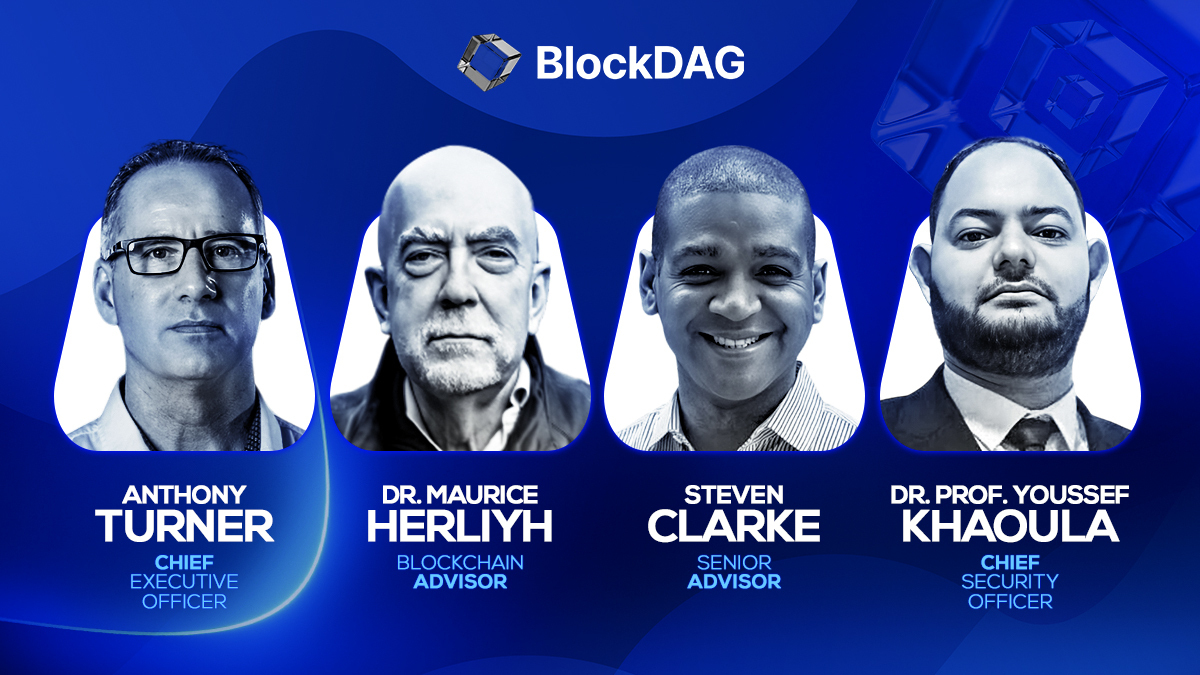
BlockDAG Network’s history is one of innovation, perseverance, and a vision to push the boundaries of blockchain technology. With Harvard alumni, tech moguls, and best-selling authors at the helm, BlockDAG is rewriting the rules of the cryptocurrency game.
CEO Antony Turner, inspired by the successes and shortcomings of Bitcoin and Ethereum, says, “BlockDAG leverages existing technology to push the boundaries of speed, security, and decentralization.” This powerhouse team has led a staggering 1,600% price increase in 20 pre-sale rounds, raising over $63.9 million. The secret? Unparalleled expertise and a bold vision for the future of blockchain.
Let’s dive into BlockDAG’s success story and find out what the future holds for this cryptocurrency.
The Origin: Why BlockDAG Was Created
In a recent interview, BlockDAG CEO Antony Turner perfectly summed up why the market needs BlockDAG’s ongoing revolution. He said:
“The creation of BlockDAG was inspired by Bitcoin and Ethereum, their successes and their shortcomings.
If you look at almost any new technology, it is very rare that the first movers remain at the forefront forever. Later incumbents have a huge advantage in entering a market where the need has been established and the technology is no longer cutting edge.
BlockDAG has done just that: our innovation is incorporating existing technology to provide a better solution, allowing us to push the boundaries of speed, security, and decentralization.”
The Present: How Far Has BlockDAG Come?
BlockDAG’s presale is setting new benchmarks in the cryptocurrency investment landscape. With a stunning 1600% price increase over 20 presale lots, it has already raised over $63.9 million in capital, having sold over 12.43 billion BDAG coins.
This impressive performance underscores the overwhelming confidence of investors in BlockDAG’s vision and leadership. The presale attracted over 20,000 individual investors, with the BlockDAG community growing exponentially by the hour.

These monumental milestones have been achieved thanks to the unparalleled skills, experience and expertise of BlockDAG’s management team:
Antony Turner – Chief Executive Officer
Antony Turner, CEO of BlockDAG, has over 20 years of experience in the Fintech, EdTech, Travel and Crypto industries. He has held senior roles at SPIRIT Blockchain Capital and co-founded Axona-Analytics and SwissOne. Antony excels in financial modeling, business management and scaling growth companies, with expertise in trading, software, IoT, blockchain and cryptocurrency.
Director of Communications
Youssef Khaoulaj, CSO of BlockDAG, is a Smart Contract Auditor, Metaverse Expert, and Red Team Hacker. He ensures system security and disaster preparedness, and advises senior management on security issues.
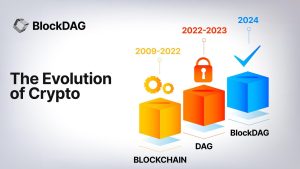
advisory Committee
Steven Clarke-Martin, a technologist and consultant, excels in enterprise technology, startups, and blockchain, with a focus on DAOs and smart contracts. Maurice Herlihy, a Harvard and MIT graduate, is an award-winning computer scientist at Brown University, with experience in distributed computing and consulting roles, most notably at Algorand.
The Future: Becoming the Cryptocurrency with the Highest Market Cap in the World
Given its impressive track record and a team of geniuses working tirelessly behind the scenes, BlockDAG is quickly approaching the $600 million pre-sale milestone. This crypto powerhouse will soon enter the top 30 cryptocurrencies by market cap.
Currently trading at $0.017 per coin, BlockDAG is expected to hit $1 million in the coming months, with the potential to hit $30 per coin by 2030. Early investors have already enjoyed a 1600% ROI by batch 21, fueling a huge amount of excitement around BlockDAG’s presale. The platform is seeing significant whale buying, and demand is so high that batch 21 is almost sold out. The upcoming batch is expected to drive prices even higher.

Invest in BlockDAG Pre-Sale Now:
Pre-sale: https://purchase.blockdag.network
Website: https://blockdag.network
Telegram: https://t.me/blockDAGnetwork
Discord: Italian: https://discord.gg/Q7BxghMVyu
No spam, no lies, just insights. You can unsubscribe at any time.
Tech
How Karak’s Latest Tech Integration Could Make Data Breaches Obsolete
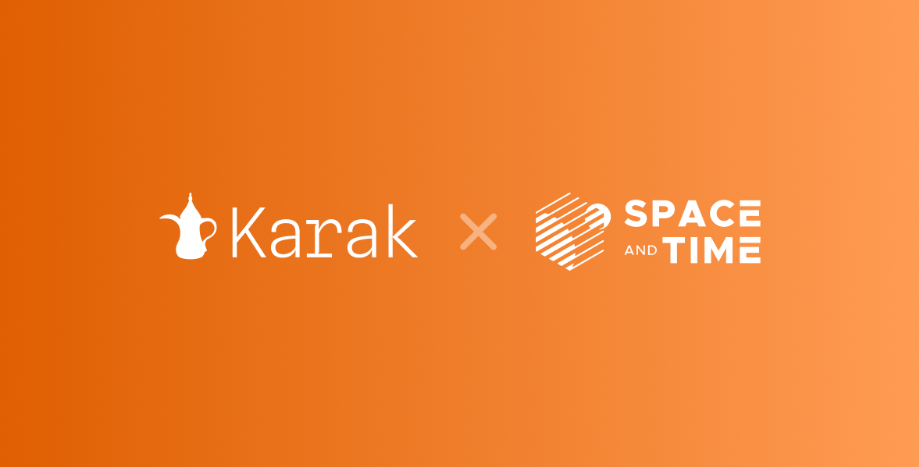
- Space and Time uses zero-knowledge proofs to ensure secure and tamper-proof data processing for smart contracts and enterprises.
- The integration facilitates faster development and deployment of Distributed Secure Services (DSS) on the Karak platform.
Karak, a platform known for its strong security capabilities, is enhancing its Distributed Secure Services (DSS) by integrating Space and Time as a zero-knowledge (ZK) coprocessor. This move is intended to strengthen trustless operations across its network, especially in slashing and rewards mechanisms.
Space and Time is a verifiable processing layer that uses zero-knowledge proofs to ensure that computations on decentralized data warehouses are secure and untampered with. This system enables smart contracts, large language models (LLMs), and enterprises to process data without integrity concerns.
The integration with Karak will enable the platform to use Proof of SQL, a new ZK-proof approach developed by Space and Time, to confirm that SQL query results are accurate and have not been tampered with.
One of the key features of this integration is the enhancement of DSS on Karak. DSS are decentralized services that use re-staked assets to secure the various operations they provide, from simple utilities to complex marketplaces. The addition of Space and Time technology enables faster development and deployment of these services, especially by simplifying slashing logic, which is critical to maintaining security and trust in decentralized networks.
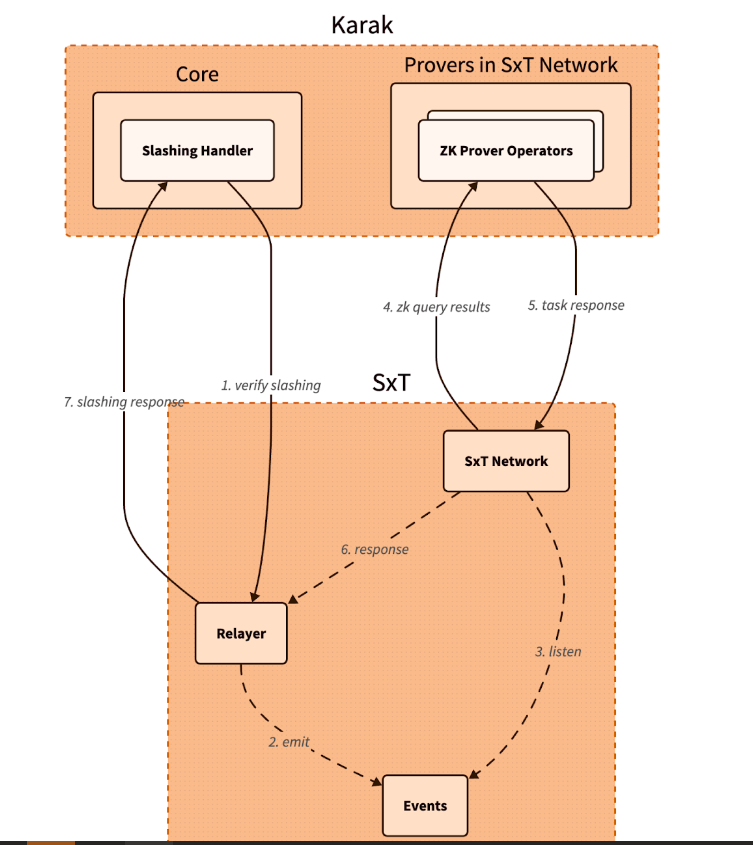
Additionally, Space and Time is developing its own DSS for blockchain data indexing. This service will allow community members to easily participate in the network by running indexing nodes. This is especially beneficial for applications that require high security and decentralization, such as decentralized data indexing.
The integration architecture follows a detailed and secure flow. When a Karak slashing contract needs to verify a SQL query, it calls the Space and Time relayer contract with the required SQL statement. This contract then emits an event with the query details, which is detected by operators in the Space and Time network.
These operators, responsible for indexing and monitoring DSS activities, validate the event and route the work to a verification operator who runs the query and generates the necessary ZK proof.
The result, along with a cryptographic commitment on the queried data, is sent to the relayer contract, which verifies and returns the data to the Karak cutter contract. This end-to-end process ensures that the data used in decision-making, such as determining penalties within the DSS, is accurate and reliable.
Karak’s mission is to provide universal security, but it also extends the capabilities of Space and Time to support multiple DSSs with their data indexing needs. As these technologies evolve, they are set to redefine the secure, decentralized computing landscape, making it more accessible and efficient for developers and enterprises alike. This integration represents a significant step towards a more secure and verifiable digital infrastructure in the blockchain space.
Website | X (Twitter) | Discord | Telegram
No spam, no lies, just insights. You can unsubscribe at any time.
Tech
Cryptocurrency Payments: Should CFOs Consider This Ferrari-Approved Trend?

Iconic Italian luxury carmaker Ferrari has announced the expansion of its cryptocurrency payment system to its European dealer network.
The move, which follows a successful launch in North America less than a year ago, raises a crucial question for CFOs across industries: Is it time to consider accepting cryptocurrency as a form of payment for your business?
Ferrari’s move isn’t an isolated one. It’s part of a broader trend of companies embracing digital assets. As of 2024, we’re seeing a growing number of companies, from tech giants to traditional retailers, accepting cryptocurrencies.
This change is determined by several factors:
- Growing mainstream adoption of cryptocurrencies
- Growing demand from tech-savvy and affluent consumers
- Potential for faster and cheaper international transactions
- Desire to project an innovative brand image
Ferrari’s approach is particularly noteworthy. They have partnered with BitPay, a leading cryptocurrency payment processor, to allow customers to purchase vehicles using Bitcoin, Ethereum, and USDC. This satisfies their tech-savvy and affluent customer base, many of whom have large digital asset holdings.
Navigating Opportunities and Challenges
Ferrari’s adoption of cryptocurrency payments illustrates several key opportunities for companies considering this move. First, it opens the door to new customer segments. By accepting cryptocurrency, Ferrari is targeting a younger, tech-savvy demographic—people who have embraced digital assets and see them as a legitimate form of value exchange. This strategy allows the company to connect with a new generation of affluent customers who may prefer to conduct high-value transactions in cryptocurrency.
Second, cryptocurrency adoption increases global reach. International payments, which can be complex and time-consuming with traditional methods, become significantly easier with cryptocurrency transactions. This can be especially beneficial for businesses that operate in multiple countries or deal with international customers, as it potentially reduces friction in cross-border transactions.
Third, accepting cryptocurrency positions a company as innovative and forward-thinking. In today’s fast-paced business environment, being seen as an early adopter of emerging technologies can significantly boost a brand’s image. Ferrari’s move sends a clear message that they are at the forefront of financial innovation, which can appeal to customers who value cutting-edge approaches.
Finally, there is the potential for cost savings. Traditional payment methods, especially for international transactions, often incur substantial fees. Cryptocurrency transactions, on the other hand, can offer lower transaction costs. For high-value purchases, such as luxury cars, these savings could be significant for both the business and the customer.
While the opportunities are enticing, accepting cryptocurrency payments also presents significant challenges that businesses must address. The most notable of these is volatility. Cryptocurrency values can fluctuate dramatically, sometimes within hours, posing potential risk to businesses that accept them as payment. Ferrari addressed this challenge by implementing a system that instantly converts cryptocurrency received into traditional fiat currencies, effectively mitigating the risk of value fluctuations.
Regulatory uncertainty is another major concern. The legal landscape surrounding cryptocurrencies is still evolving in many jurisdictions around the world. This lack of clear and consistent regulations can create compliance challenges for companies, especially those operating internationally. Companies must remain vigilant and adaptable as new laws and regulations emerge, which can be a resource-intensive process.
Implementation costs are also a significant obstacle. Integrating cryptocurrency payment systems often requires substantial investment in new technology infrastructure and extensive staff training. This can be especially challenging for small businesses or those with limited IT resources. The costs are not just financial; a significant investment of time is also required to ensure smooth implementation and operation.
Finally, security concerns loom large in the world of cryptocurrency transactions. While blockchain technology offers some security benefits, cryptocurrency transactions still require robust cybersecurity measures to protect against fraud, hacks, and other malicious activity. Businesses must invest in robust security protocols and stay up-to-date on the latest threats and protections, adding another layer of complexity and potential costs to accepting cryptocurrency payments.
Strategic Considerations for CFOs
If you’re thinking of following in Ferrari’s footsteps, here are the key factors to consider:
- Risk Assessment: Carefully evaluate potential risks to your business, including financial, regulatory, and reputational risks.
- Market Analysis: Evaluate whether your customer base is significantly interested in using cryptocurrencies for payments.
- Technology Infrastructure: Determine the costs and complexities of implementing a cryptographic payment system that integrates with existing financial processes.
- Regulatory Compliance: Ensure that cryptocurrency acceptance is in line with local regulations in all markets you operate in. Ferrari’s gradual rollout demonstrates the importance of this consideration.
- Financial Impact: Analyze how accepting cryptocurrency could impact your cash flow, accounting practices, and financial reporting.
- Partnership Evaluation: Consider partnering with established crypto payment processors to reduce risk and simplify implementation.
- Employee Training: Plan comprehensive training to ensure your team is equipped to handle cryptocurrency transactions and answer customer questions.
While Ferrari’s adoption of cryptocurrency payments is exciting, it’s important to consider this trend carefully.
A CFO’s decision to adopt cryptocurrency as a means of payment should be based on a thorough analysis of your company’s specific needs, risk tolerance, and strategic goals. Cryptocurrency payments may not be right for every business, but for some, they could provide a competitive advantage in an increasingly digital marketplace.
Remember that the landscape is rapidly evolving. Stay informed about regulatory changes, technological advancements, and changing consumer preferences. Whether you decide to accelerate your crypto engines now or wait in the pit, keeping this payment option on your radar is critical to navigating the future of business transactions.
Was this article helpful?
Yes No
Sign up to receive your daily business insights
Tech
Bitcoin Tumbles as Crypto Market Selloff Mirrors Tech Stocks’ Plunge
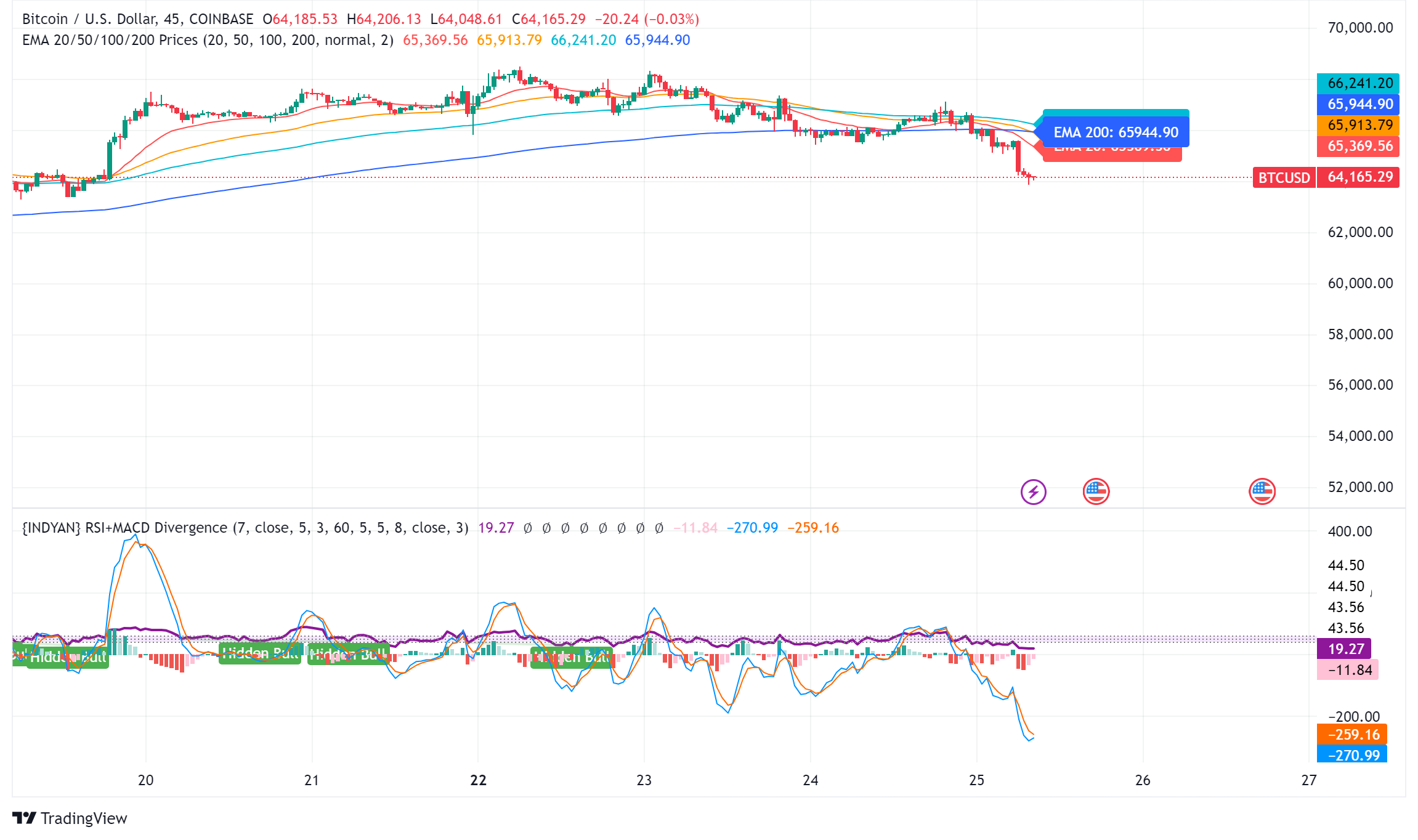
The world’s largest cryptocurrency, Bitcoin (BTC), suffered a significant price decline on Wednesday, falling below $65,000. The decline coincides with a broader market sell-off that has hit technology stocks hard.
Cryptocurrency Liquidations Hit Hard
CoinGlass data reveals a surge in long liquidations in the cryptocurrency market over the past 24 hours. These liquidations, totaling $220.7 million, represent forced selling of positions that had bet on price increases. Bitcoin itself accounted for $14.8 million in long liquidations.
Ethereum leads the decline
Ethereal (ETH), the second-largest cryptocurrency, has seen a steeper decline than Bitcoin, falling nearly 8% to trade around $3,177. This decline mirrors Bitcoin’s price action, suggesting a broader market correction.
Cryptocurrency market crash mirrors tech sector crash
The cryptocurrency market decline appears to be linked to the significant losses seen in the U.S. stock market on Wednesday. Stock market listing The index, heavily weighted toward technology stocks, posted its sharpest decline since October 2022, falling 3.65%.
Analysts cite multiple factors
Several factors may have contributed to the cryptocurrency market crash:
- Tech earnings are underwhelming: Earnings reports from tech giants like Alphabet are disappointing (Google(the parent company of), on Tuesday, triggered a sell-off in technology stocks with higher-than-expected capital expenditures that could have repercussions on the cryptocurrency market.
- Changing Political Landscape: The potential impact of the upcoming US elections and changes in Washington’s policy stance towards cryptocurrencies could influence investor sentiment.
- Ethereal ETF Hopes on the line: While bullish sentiment around a potential U.S. Ethereum ETF initially boosted the market, delays or rejections could dampen enthusiasm.
Analysts’ opinions differ
Despite the short-term losses, some analysts remain optimistic about Bitcoin’s long-term prospects. Singapore-based cryptocurrency trading firm QCP Capital believes Bitcoin could follow a similar trajectory to its post-ETF launch all-time high, with Ethereum potentially converging with its previous highs on sustained institutional interest.
Rich Dad Poor Dad Author’s Prediction
Robert Kiyosaki, author of the best-selling Rich Dad Poor Dad, predicts a potential surge in the price of Bitcoin if Donald Trump is re-elected as US president. He predicts a surge to $105,000 per coin by August 2025, fueled by a weaker dollar that is set to boost US exports.
BTC/USD Technical Outlook
Bitcoin price is currently trading below key support levels, including the $65,500 level and the 100 hourly moving average. A break below the $64,000 level could lead to further declines towards the $63,200 support zone. However, a recovery above the $65,500 level could trigger another increase in the coming sessions.
-

 News10 months ago
News10 months agoVolta Finance Limited – Director/PDMR Shareholding
-

 News10 months ago
News10 months agoModiv Industrial to release Q2 2024 financial results on August 6
-

 News10 months ago
News10 months agoApple to report third-quarter earnings as Wall Street eyes China sales
-

 News10 months ago
News10 months agoNumber of Americans filing for unemployment benefits hits highest level in a year
-

 News1 year ago
News1 year agoInventiva reports 2024 First Quarter Financial Information¹ and provides a corporate update
-

 News1 year ago
News1 year agoLeeds hospitals trust says finances are “critical” amid £110m deficit
-

 DeFi1 year ago
DeFi1 year ago🏴☠️ Pump.Fun operated by Insider Exploit
-

 Tech1 year ago
Tech1 year agoBitcoin’s Correlation With Tech Stocks Is At Its Highest Since August 2023: Bloomberg ⋆ ZyCrypto
-

 Tech1 year ago
Tech1 year agoEverything you need to know
-

 Markets12 months ago
Markets12 months ago20 Top Crypto Trading Platforms to Know
-

 News10 months ago
News10 months agoStocks wobble as Fed delivers and Meta bounces
-

 Markets1 year ago
Markets1 year agoWhale Investments in Bitcoin Hit $100 Billion in 2024, Fueling Insane Investor Optimism ⋆ ZyCrypto












